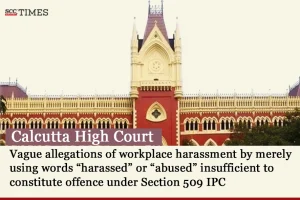Calcutta High Court: The petitioner approached the Court seeking quashing of criminal proceedings arising from an FIR lodged over alleged workplace harassment, which had resulted in a chargesheet under Section 509 of the Penal Code, 1860 (‘IPC’). The allegations pertained to incidents between 2016-2017, reported over a year after the complainant’s resignation. A Single Judge Bench of Ajoy Kumar Mukherjee, J., while allowing the petition, held that only using the words “harassed” or “abused”, did not demonstrate the requisite intention or knowledge which could lead to the conclusion that any alleged act of the petitioner constituted an insult to the complainant’s modesty. The Court emphasised that mere harassment at workplace or abusing her at workplace might not constitute an offence under Section 509 IPC, unless essential ingredients were fulfilled.
Background:
The complainant filed an FIR in October 2018 alleging that she was subjected to harassment and severe bullying at her workplace by the petitioner and his female crony. Initially registered under Sections 354 and 114 IPC, after completion of investigation, the investigating agency submitted charge sheet under Section 509 IPC. The petitioner argued that the instant FIR was lodged with a view to spite him because of a private and personal grudge such as professional rivalry, strenuous relation and with an oblique motive of implicating him in long and arduous criminal proceedings.
The complainant also filed a complaint with the Internal Complaints Committee (‘ICC’) of her former employer, alleging sexual harassment by the petitioner on her in terms of the Sexual Harassment of Women at Workplace (Prevention, Prohibition and Redressal) Act, 2013 (‘Act of 2013’). However, although the ICC was time-barred, it conducted a detailed and thorough enquiry into the allegations levelled against the petitioner, but since no evidence could be gathered against him, the ICC exonerated him of all charges.
The complainant contended that she was publicly abused, humiliated and harassed causing her mental agony that affected her health. She further alleged that the petitioner was a habitual offender, and several instances of the same kind of allegation had been levelled against him. It was argued that if a delinquent had been discharged from the departmental proceeding at the instance of the internal committee, the same discharge could not be a ground for quashing of the criminal proceeding arising out of a same cause of action because two proceedings were separate.
Analysis and Decision:
The Court examined the ingredients to constitute an offence under Section 509 IPC and observed that to constitute such an offence, there must be an allegation that the action complained of had insulted the modesty of some particular woman or women and not merely of any class or order or section of women, however small. The Court noted that the FIR, the charge sheet and materials collected during investigation did not suggest any specific details of the words, sounds or gesture by which the petitioner allegedly insulated her modesty, nor it suggested how and when he intruded upon the complainant’s modesty.
The Court observed that the complainant gave no probable explanation for the one-year delay in lodging the FIR. Moreover, the police could not seize documents or collect cogent evidence to support essential ingredients. Also, the FIR and investigation materials, including the statements recorded under Section 161 of the Criminal Procedure Code, 1973 lacked any allegation of sound, gesture, or object exhibition. The Court further noted that the complainant only stated that the petitioner abused her during 2016—2017 but did not specify the nature of harassment or abuse, even before the Magistrate, to determine if a prima facie offence under Section 509 IPC was made out.
The Court emphasised that unless there had been reference to specific words used, contextual details or any gesture, it was hardly possible to demonstrate that the petitioner had criminal intent to insult the modesty and/or to establish any case against the petitioner. The Court highlighted that mere using the words “harassed” or “abused”, did not demonstrate the requisite intention or knowledge which could lead to the conclusion that any alleged act of the petitioner constituted an insult to the complainant’s modesty.
The Court relied on Radheshyam Kejriwal v. State of West Bengal, (2011) 3 SCC 581, wherein it was held that in case of exoneration (adjudication proceeding/departmental proceeding) on merits where allegation was found to be not sustainable and person held innocent, criminal prosecution on the same set of fact and circumstances could not be allowed to continue underlying principle being the higher standard of proof in criminal cases. The Court further emphasised that since it was not disputed that the allegations in both proceedings were identical and the petitioner was exonerated on merit, continuing the trial would be an abuse of the process of the court.
The Court, while quashing the pending criminal proceeding allowed the petition, holding that to establish mens rea something better than vague statement was to be produced before the Court.
[X v. State of West Bengal, 2025 SCC OnLine Cal 6172, decided on 28-07-2025]
Advocates who appeared in this case :
For the Petitioner: Ayan Bhattacharjee, Senior Advocate, Md. Zohaib Rauf
For the Opposite Parties: Prasenjit Mukherjee, Saptarshi Chakraborty, Rajdeep Bosu, Debasish Roy, PP, Sreyashee Biswas, Puja Goswami


